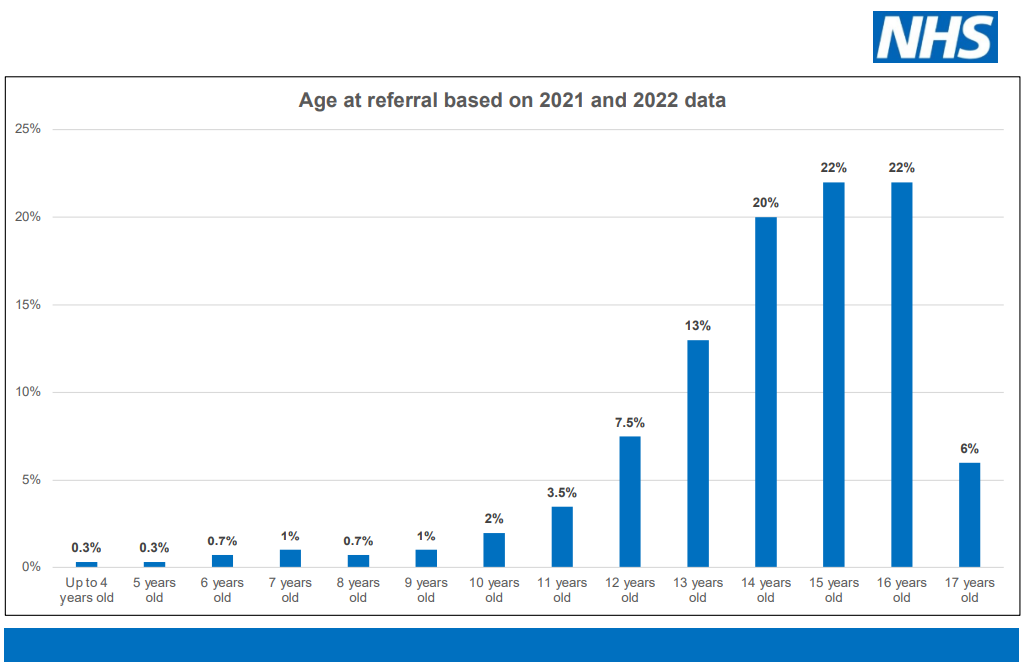The NHS published its proposed Interim Service Specification for the treatment of ‘gender dysphoria’ on 20th October 2022
The NHS is consulting on this Interim Service Specification for what they are calling Specialist service for children and young people with gender dysphoria (phase 1 providers)
The consultation runs from 20th October 2022 to 4th December 2022
This is our initial response. A fuller analysis, together with guidance on how to make a submission to the associated consultation has been published here.
First impressions
1) The language used in the document reflects an NHS still captured by Gender Identity Ideology. For example, the word ‘gender’ is used throughout. Specious concepts such as ‘gender identity’ and ‘sex assigned at birth’ are used.
2) There is still a risk of puberty blockers being given. Although the circumstances under which puberty blockers may be prescribed have been restricted to patients participating in proper scientific research, this still smacks of experimenting on children. Moreover, as we know from the history of The Dutch Protocol, any loophole will be exploited and expanded. Children can only be safe from ideologically driven medical experiments if those experiments are banned completely. Administering puberty blockers for reasons of discomfort with one’s sexed body is not proper medicine. Puberty blockers are not reversible, and the long term effects on humans are only now coming to light, and none seem beneficial. Experiments on sheep show impaired cognitive development.
3) There is still a risk of Opposite Sex Imitation Treatments. While the closure of GIDS at The Tavistock Centre is to be welcomed, the opening of two further clinics is cause for concern. The Interim Service Specification provides for these clinics to be better run than was The Tavistock. However, the pathway to opposite sex imitation hormones is not explicitly shut down. Moreover, the proposed Multi-Disciplinary Teams include endocrinologists. The only role hormone doctors can be allowed to have is ensuring patients have normal hormone levels for their sex. This role is peripheral to, and not central to, helping children rid themselves of their transgender ideation.
4) There is no mention or indication that the medical profession’s duty is to target 100% desistance (or detransition for existing patients).
5) The upper age limit is set at 18 which is both inconsistent with the science and with NHS Long Term plan for delivering adolescent mental health services (which will bring the upper age to a sensible 25).
The answer to the question:
“Do the proposed Interim Service Specifications meet the requirement for children and adolescents to be safe from the risk of unnecessary medical harm resulting from transgender ideation?”
is “No.”.
This is a simple test. We can apply it consistently to all developments and announcements.
Some Positives, but…
NHS England is making progress. These proposed specifications are indicative of a move in the right direction. But this progress is painfully slow.
We must welcome the improvements to ‘gatekeeping’ and the movement towards a more holistic and psychosocial approach (which we have been advocating since our foundation).
However, until it divests itself of gender ideology, children and young people with thoughts of being transgender are not safe under NHS ‘care’.
This excruciatingly slow progress has huge costs.
We must not lose sight of the fact that the NHS is still paying for adolescent girls and young women to have their breasts removed without any clinical need. They are also receiving male hormones that can lead to uterine atrophy, iatrogenic hysterectomies, early menopause and osteoporosis. The NHS is still allowing adolescent boys to receive female hormones which cause genitalia to shrink, breasts to grow, and sterility to be likely.
There is an urgent need for an immediate moratorium on opposite sex imitation treatments.
We have published a more detailed response, alongside our guidance on responding to the associated consultation, here.
Read the Interim Service Specification here
Read the Consultation Guide
Equality and Health Inequalities Impact Assessment
Other responses:
Transgender Trend: https://www.transgendertrend.com/new-nhs-service-specification-consultation/

